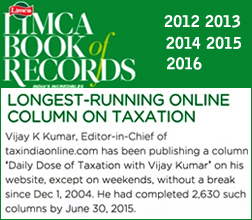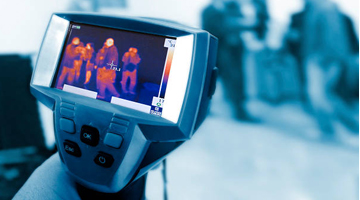 TIOL-DDT 2887 TIOL-DDT 2887
13 07 2016
Wednesday
IN the CBEC's Outreach Programme at Hyderabad on Monday, CBEC Member, Ram Tirath stated that assessees under the GST will have to deal with only one single authority. The fear of dual control by the State Government and the Central Government on same issues has been haunting the trade ever since GST appeared on the horizon.
Will there be a single authority for registration, SCN, adjudication, appeal, audit, investigation, summons, assessment, returns, refund and other formalities ? Or will there be double trouble with both the State and Central GST authorities breathing down the necks of harried assessees?
In such a situation, the announcement by the CBEC Member is a welcome breeze of oxygen, but unfortunately he didn't elaborate. I tried to contact him and Mr. Upender Gupta, Commissioner, GST to find out if there would be really only one authority for all the above purposes, by phone, mail and SMS, but couldn't succeed.
Some of the likely dual controls could be:
1. As per Section 38 of the Model GST Law, refund application is to be made to the proper officer of IGST/CGST/SGST;
2. As per Section 60, a CGST/SGST officer, not below the rank of Joint Commissioner, can order inspection, search and seizure.
3. Under Section 62, the Commissioner of CGST or the Commissioner of SGST can authorise any CGST/SGST officer to arrest an alleged offender.
4. Section 63 vests any CGST/SGST officer, duly authorised by the competent authority with the power to summon any person.
5. As per Section 64, any CGST/SGST officer authorized by the Additional/Joint Commissioner of CGST or SGST shall have access to any business premises to inspect books of account.
6. Under Section 122, the Commissioner of CGST/SGST or an officer authorized by him may take samples of goods from the possession of any taxable persons.
The model law stipulates that rejection of an application for registration by a CGST officer will be deemed a rejection under the SGST Act also - and vice-versa.
Central Excise - Ready Made Garments - Registration - No Verification of Premises
EVERY person, who produces, manufactures, carries on trade, holds private store-room or warehouse or otherwise uses excisable goods or an importer who issues an invoice on which CENVAT credit can be taken, shall get registered, as per Rule 9(1) of the Central Excise Rules.
Notification No. 35/2001-CE, dated 26.06.2001, specifies the conditions, safeguards and procedures for registration of a person under the said rules and exemptions from registration in specified cases. As per clause 8 of this Notification, the authorized officer is required to verify the premises physically within seven days from the date of receipt of the Registration Application through online.
Now, the Government has exempted Every manufacturing factory or premises engaged in the manufacture or production of goods falling under Chapters 61, 62 or 63 (except laminated jute bags falling under headings or tariff item 6305, 6309 00 00 or 6310) of the First Schedule to the Central Excise Tariff Act, bearing a brand name or sold under a brand name and having a retail sale price (RSP) of one thousand rupees and above, from this mandatory verification.
| Chapter 61 |
Articles of apparel and clothing accessories, Knitted or Crocheted |
| Chapter 62 |
Articles of Apparel and Clothing Accessories, not knitted or Crocheted |
| Chapter 63 |
Other made up textile articles; sets; worn clothing and worn textile articles; rags |
Notification No. 32/2016-CE(NT)., Dated: July 11, 2016
Customs - Textiles - Exemption -Cotton Textiles Export Promotion Council authorised to issue certificate
AS per Sl. No. 284A of the table to the Notification No. 12/2012-Cus, dated 17.03.2012, certain textile items are exempted if they are imported for manufacture of textile garments, with certain export conditions. The importer should produce a certificate from the Apparel Export Promotion Council or the Synthetic and Rayon Textile Export Promotion Council, as the case may be, certifying the value of exports, imports etc.
Now, the Cotton Textiles Export Promotion Council is also authorized to issue this certificate.
Notification No. 42/2016-Cus., Dated: July 11, 2016
Service Tax - Fee Paid for e-tender
MANY companies are conducting the e-tender. While e-tender is conducted by the company some fees is prescribed for participation and the fees so paid would entitle the applicant to participate in the e-tender. Whether such fees paid will form consideration for the purpose of levy of service tax? Whether the answer will be same when the applicant is issued with physical documents to fill up and participate in the tender ?
This was a question raised in the RAC meeting of Hyderabad Central Excise Zone held on 30.06.2016.
A Commissioner observed that service element comes into play as tender floater and tender participant are there and according to Section 65B(44) of the Finance Act 1994, Service means "any activity carried out by a person for another for consideration, and includes a declared service"; accordingly Service Tax is liable to be paid on the fee paid for filing the e-tender.
Another Commissioner stated that it is not the cost of application but the act of allowance for tender Participation has much more intrinsic value and hence service tax is liable to be paid.
The Chief Commissioner held that the matter would be referred to Board for clarification and till such time Service tax may be paid on the fee collected for allowing a participant to file e-tender.
Service Tax - fines, penalties and liquidated damages
ANOTHER question raised in the meeting was:
In many cases, companies are collecting fines, penalties and liquidated damages from their customers for any deficiency of performance or shortfall of supply/contract. These situations are very common and the amount so collected will form part other revenue of the company and as per the accounting standards, it cannot be clubbed with the normal revenue from operations. Whether such penalties, compensation for not doing, or shortfall in handling any prescribed quantity or deficiency in service, not completing the job within the prescribed period of time as agreed by contract would also attract service tax?
A Commissioner informed that issues similar to the point raised have been confirmed by him in favour of revenue as the fines, penalties and liquidated damages collected in the course of provision of service are liable for service tax as per Section 66E(e) of Finance Act, 1994, according to which "agreeing to the obligation to refrain from an act, or to tolerate an act or a situation, or to do an act" is a declared service and a taxable event. Hence, Fines, penalties and liquidated damages which are collected from customers in lieu of either deficiency in performance of service or violation of terms and conditions of agreement are liable to service tax under Section 66E(e)of Finance Act, 1994. It was also stated that, some of the cases are pending disposal at CESTAT.
The Chief Commissioner informed the members present in the meeting to continue to pay the Service Tax on the subject matter, since the issues similar to the point raised are pending in Tribunal as informed by the Commissioner, and the outcome of these cases may be awaited.
CBEC Taxpayer's Experience Survey -Some Suggestions
SOME of the suggestions received during the Taxpayer's Experience Survey:
• Electronic taxpayer services
• Assessee should not suffer demurrage charges due to issues with ICEGATE website.
• Digitisation of audit records to reduce seeking same information again during next audit.
• Telephone number and e-mails of all officers should be available on web portal.
• Reduction in outages/short notice maintenance work for e-filing services.
• Create an online interactive platform to grant various permissions from jurisdictional Commissioner with facility to seek online comments from divisional/range office.
• Custom duty payments made through bank should be updated immediately.
• Allow interface of ACES and ICEGATE with IT platform of DGFT.
• Submission of information or replies should be accepted by registered e-mails with automated acknowledgment facility.
• E-filing system should be compatible with various platforms like Internet Explorer, Firefox, etc.
• Online forms should be made easier and training should be imparted to industry for compliance.
• Systems issues should be resolved in time bound manner.
• Servers should be upgraded to handle the load during peak hours/due dates.
• Any extension in the due dates due to system issues should be informed well in advance.
• Develop online system for issuing Form A1/A2 for SEZs.
Dispute resolution
• Quasi-judicial functions of adjudications to be vested in a separate wing reporting to CBEC to achieve merit based decisions/orders.
• Facts to be ascertained/confirmed before issuance of demand notice instead of notices being issued in a routine manner on pre-conceived notions/conclusions.
• Fix responsibility for raising demand notices on frivolous grounds.
• Introduce mandatory handover rules- transferred officer should be legally empowered to operate at the station for 2 months to complete the adjudication of cases where personal hearing has been concluded.
• Fast track dispute resolution - Club show cause notices on similar matters across Commissionerates and pass a single order.
• CBEC to take merit-based stand in critical matters to reduce issuance of repetitive demands on same/settled issue.
• Reduce the frequency of amendments in tax laws.
• Seek periodical report from each Commissionerate with industry data of issue-wise demands raised dropped at adjudication / first appeal level to check quality of demand notices.
• An approach of ‘go and deal with higher level' should be avoided.
• Issue industry wise guide/circulars on applicability of tax provisions to that industry.
• Set up mechanism to deliberate and resolve industry wise issues arising due to difference of opinion/interpretation of law.
• Set up helpdesks to resolve the various issues faced by taxpayers to reduce litigation.
• Audit should not be conducted with the sole motive to raise demand.
• Departmental officers should collate/verify data available with them before requesting the same from the assessee.
• Inquiry/investigation must be completed in a time bound manner and it should not be an unending process.
• Cases having common facts and similar legal issues should be grouped together and only one case should be litigated for quick disposal.
• Mandatory discussion with assessee before issuance of SCN especially for high value cases .
• SCN/Orders should not be issued with a pro-revenue approach especially towards the end of the year.
• Authority for issuing the SCN and the Adjudicating authority should be different.
• Develop conducive environment for tax offices to take independent merit based decisions.
• SCN/Order-in-Original/Order-in-Appeal should be decided within the prescribed time limit or it should be deemed to be dropped.
• Deploy appropriate additional staff to expedite decisions in pending matters.
• Concerted efforts needed to dispose of the old pending matters.
• Consider introducing personal hearings through video conferences.
• Approach of authorities must be constructive and they should trust the taxpayer.
• Penalty should not be imposed mechanically in all cases; due regard should be given to the facts of the case
• Adjudicating authority should pass order before being relieved on transfer where hearing in cases have been completed.
• Customs officers must issue a speaking order if they have contrary view on self-assessed bill of entry.
• Provide clarity on tax positions (specially CENVAT credit eligibility) to reduce litigation.
• Set up separate benches of CESTAT to fast track high value litigation.
We will bring more from the survey tomorrow.
Until Tomorrow with more DDT
Have a nice Day.
Mail your comments to vijaywrite@tiol.in |









 Download PDF
Download PDF




